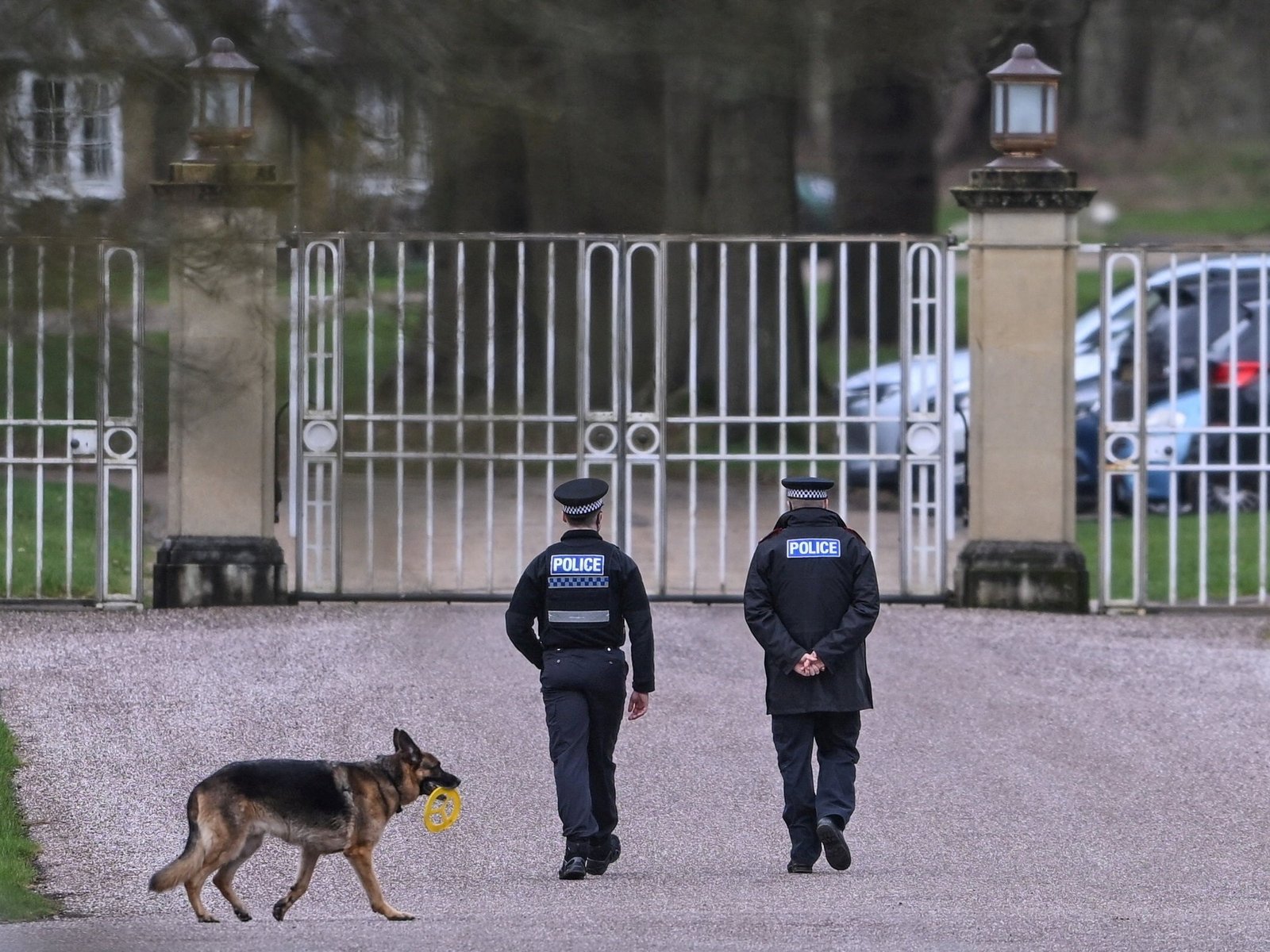INTERNACIONAL
House bipartisan bill directs NSA to create ‘AI security playbook’ amid Chinese tech race

NEWYou can now listen to Fox News articles!
FIRST ON FOX – Rep. Darin LaHood, R-Ind., is introducing a new bill Thursday imploring the National Security Administration (NSA) to develop an «AI security playbook» to stay ahead of threats from China and other foreign adversaries.
The bill, dubbed the «Advanced AI Security Readiness Act,» directs the NSA’s Artificial Intelligence Security Center to develop an «AI Security Playbook to address vulnerabilities, threat detection, cyber and physical security strategies, and contingency plans for highly sensitive AI systems.»
It is co-sponsored by House Select Committee on China Chairman Rep. John Moolenaar, R-Mich., Ranking Member Rep. Raja Krishnamoorthi, D-Ill., and Rep. Josh Gottheimer, D-N.J.
LaHood, who sits on the House Intelligence Committee and the House Select Committee on China, told Fox News Digital that the legislative proposal, if passed, would be the first time Congress codifies a «multi-prong approach to ensure that the U.S. remains ahead in the advanced technology race against the CCP.» He said the bill will improve export control mechanisms – including for chips and high capacity chip manufacturing – protect covered AI technologies with a focus on cybersecurity, and limit outbound investment to firms directly tied to the Chinese Community Party or China’s People’s Liberation Army.
CHINESE BIOWEAPON SMUGGLING CASE SHOWS US ‘TRAINS OUR ENEMIES,’ ‘LEARNED NOTHING’ FROM COVID: SECURITY EXPERT
Rep. Darin LaHood, R-Ill., leaves the House Republican Conference meeting at the Capitol Hill Club in Washington, D.C., on Tuesday, May 17, 2022. (Bill Clark/CQ-Roll Call, Inc via Getty Images)
«We start with the premise that China has a plan to replace the United States. And I don’t say that to scare people or my constituents, but they have a plan to replace the United States, and they’re working on it every single day. And that entails stealing data and infiltrating our systems,» LaHood told Fox News Digital. «AI is the next frontier on that. We lead the world in technology. We lead the world when it comes to AI. But what this bill will do will again make sure that things are done the right way and the correct way, and that we’re protecting our assets and promoting the current technology that we have in our country.»
LaHood pointed to evidence uncovered by the committee that he said shows the CCP’s DeepSeek used illegal distillation techniques to steal insights from U.S. AI models to accelerate their own technology development. He also pointed to how China allegedly smuggled AI chips through Singapore intermediaries to circumvent U.S. export controls on the technology.
«As we look at, ‘How do we win the strategic competition?’ I think most experts would say we’re ahead in AI right now against China, but not by much. It is a short lead,» LaHood told Fox News Digital.
He said he is confident the bill will put the U.S. «in the best position to protect our assets here and make sure that we’re not shipping things that shouldn’t go to AI that allow them to win the AI race in China.»
«Whoever wins this race in the future, it’s going to be critical to future warfare capabilities, to, obviously, cybersecurity,» LaHood continued. «And then, whoever wins the AI competition is going to yield really unwavering economic influence in the future. And so we’re aggressive in this bill in terms of targeting those areas where we need to protect our AI and our companies here in the United States, both on the commercial side and on the government side, to put us in the best position possible.»

National Security Agency Director Gen. Timothy Haugh speaks during a Senate Committee on Intelligence Hearing on March 25, 2025 in Washington, D.C. (Andrew Harnik/Getty Images)
The legislative proposal calls on the NSA to develop a playbook that identifies vulnerabilities in AI data centers and developers producing sensitive AI technologies with an emphasis on unique «threat vectors» that do not typically arise, or are less severe, in the context of conventional information technology systems.» The bill says the NSA must develop «core insights» in how advanced AI systems are being trained to identify potential interferences and must develop strategies to «detect, prevent and respond to cyber threats by threat actors targeting covered AI technologies.»
AMAZON ANNOUNCES $20B INVESTMENT IN RURAL PENNSYLVANIA FOR AI DATA CENTERS
The bill calls on the NSA to «identify levels of security, if any, that would require substantial involvement» by the U.S. government «in the development or oversight of highly advanced AI systems.» It cites a «hypothetical initiative to build covered AI technology systems in a highly secure government environment» with certain protocols in place, such as personnel vetting and security clearance processes, to mitigate «insider threats.»
Though not directly related, the legislation is being introduced a week after FBI Director Kash Patel sounded the alarm on how the CCP continues to deploy operatives and researchers to «infiltrate» U.S. institutions. Patel laid out the risk in announcing that two Chinese nationals were charged with smuggling a potential bioweapon into the U.S.
LaHood said that case further highlights «the level of penetration and sophistication that the CCP will engage in,» but he added that his bill focuses on putting a «protective layer» on U.S. AI tech and «restricting outbound investment to China.» He pointed to how the CCP also has bought up farmland around strategic U.S. national security locations, particularly in Montana, North Dakota and South Dakota.

Rep. Darin LaHood, R-Ind., said China’s goal is to replace the United States. (ADEK BERRY/AFP via Getty Images)
«If everything was an even playing field, and we were all abiding by the same rules and standards and ethical guidelines, I have no doubt the U.S. would win [the AI race], but China has a tendency and a history of playing by a different set of rules and standards,» LaHood said. «They cheat, they steal, they take our intellectual property. Not just my opinion, that’s been factually laid out, you know, in many different instances. And that’s the reason why we need to have a bill like this.»
The bill comes as the Trump administration has been pushing to bolster artificial intelligence infrastructure in the United States, and major tech companies, including Amazon, Nvidia, Meta, OpenAI, Oracle and others, have made major investments in constructing AI-focused data centers and enhancing U.S. cloud computing. Last week, Amazon announced a $20 billion investment in constructing AI data centers in rural Pennsylvania. It followed a similar $10 billion investment in North Carolina.
CLICK HERE TO GET THE FOX NEWS APP
In late May, the NSA’s Artificial Intelligence Security Center released «joint guidance» on the «risks and best practices in AI data security.» The recommendations include implementing methods to secure the data used in AI-based systems, «such as employing digital signatures to authenticate trusted revisions, tracking data provenance, and leveraging trusted infrastructure.» The center said its guidance is «critically relevant for organizations – especially system owners and administrators within the Department of Defense, National Security Systems, and the Defense Industrial Base – that already use AI systems in their day-to-day operations and those that are seeking to integrate AI into their infrastructure.»
INTERNACIONAL
The only map you need to see to understand how serious Trump is about Iran

NEWYou can now listen to Fox News articles!
For weeks, the U.S. military has quietly amassed what President Donald Trump has described as an «armada» in Iran’s backyard. Mapped out across the Persian Gulf and beyond, the deployment tells its own story — one of calculated pressure backed by credible capability.
The latest signal of escalation is the movement of the world’s largest aircraft carrier, the U.S. Navy’s USS Gerald R. Ford, and its strike group from the Caribbean toward the Middle East.
The buildup coincides with indirect negotiations between Washington and Tehran over Iran’s disputed nuclear program. Trump has warned that the regime must fully dismantle its nuclear infrastructure — or face consequences.
THE WORLD’S TOP NUCLEAR POWERS HAVE NO ARSENAL LIMITS, HERE ARE THE COUNTRIES WITH NUKES
President Donald Trump has demanded that the Iranian regime dismantle its nuclear weapons program. (Andrew Caballero-Reynolds/AFP/Getty Images)
At the heart of America’s force projection is another carrier strike group: the USS Abraham Lincoln — a mobile fortress at sea, guarded by destroyers and equipped to unleash precision strikes at a moment’s notice. On deck, F-35 fighters and F/A-18 attack aircraft sit within range of dozens of key Iranian military and nuclear targets.
Meanwhile, in the Eastern Mediterranean, the destroyers USS Bulkeley and USS Roosevelt provide additional strike capability and missile defense coverage — and could potentially assist Israel in defending against any Iranian counterattack.
WORLD’S LARGEST AIRCRAFT CARRIER HEADS TO MIDDLE EAST AS IRAN NUCLEAR TENSIONS SPIKE DRAMATICALLY
Farther south, in the Red Sea, the USS Delbert B. Black adds another layer of firepower along one of the world’s most important shipping lanes. The Red Sea links the Mediterranean to the Indian Ocean through the Suez Canal, a corridor that carries a significant share of global trade and energy supplies.
A U.S. destroyer there not only protects commercial traffic but also gives Washington the flexibility to respond quickly to threats moving between the Middle East and Europe.
Even closer to Iran’s coastline, in the Persian Gulf and the Strait of Hormuz, the USS McFaul and USS Mitscher are operating in one of the most strategically sensitive waterways on the planet. Roughly a fifth of the world’s oil passes through the Strait of Hormuz each day. Their presence signals that the U.S. can both defend that vital choke point and, if necessary, strike Iranian targets from close range.
IRAN DRAWS MISSILE RED LINE AS ANALYSTS WARN TEHRAN IS STALLING US TALKS

Alongside the warships in the region are advanced aircraft such as the F-35 fighter, a jet designed to slip past air defenses and hit targets with precision. (Cpl. Isaac Cantrell/U.S. Marine Corps)
Beyond naval forces, U.S. air power is spread across multiple Middle Eastern bases, giving commanders the ability to strike, defend and sustain operations quickly.
Several types of combat aircraft are operating from regional bases, including F-15s, F-16s and the radar-evading F-35. The A-10 specializes in close-air support missions against armored threats.
Those fighters are backed by a network of support aircraft. KC-135 and KC-46 tankers refuel jets midair, allowing them to fly farther and stay aloft longer. EA-18G electronic warfare aircraft can jam enemy radar and communications. E-3 Sentry aircraft serve as airborne command centers, tracking threats across wide areas. P-8 Poseidon planes patrol and monitor maritime activity.
CLICK HERE TO DOWNLOAD THE FOX NEWS APP
Additionally, heavy transports — including C-5 Galaxy and C-17 Globemaster aircraft — move troops and equipment, while MQ-9 Reaper drones provide surveillance and can carry precision weapons. The assets give U.S. commanders flexibility to operate across air, sea and land.
Taken together, the air and naval deployments create overlapping strike capability, missile defense coverage and control over major maritime routes. For Iran, it means U.S. forces are not concentrated in a single vulnerable location — they are distributed, layered and positioned to operate from multiple directions at once.
iran,middle east,donald trump,white house,nuclear proliferation,national security
INTERNACIONAL
“Cumbres borrascosas”: por qué Joyce Carol Oates no enseñaría la novela a sus estudiantes

“Los comentarios sobre Wuthering Heights resultan tan tristes. Es evidente que muchos, la mayoría, solo han leído la primera parte y no la segunda; la novela es de una ambición enorme porque dramatiza un arco de experiencia que en realidad abarca décadas”, publicó Joyce Carol Oates —autora estadounidense referente y activa usuaria de X—, reabriendo el debate en torno a la polémica por Cumbres borrascosas tras el estreno de la versión cinematográfica dirigida por Emerald Fennel. La discusión, centrada en el legado de Emily Brontë -autora de la novela- ganó impulso en redes sociales, al reunir un agudo cruce generacional sobre la recepción de los clásicos del siglo XIX.

Cumbres borrascosas
eBook
Oates identifica una distancia radical entre la experiencia lectora actual y la que requiere una obra como Cumbres borrascosas.Por eso, dijo, le resultaban tristres los comentarios. La autora de Blonde, Mamá y Memorias de una viuda habló de cómo fue, en su momento, el debut de Emily Brontë: “Es un logro para una novelista que publica por primera vez, igual que Jane Eyre de la hermana de Emily, Charlotte Brontë”, compartió Oates en X.
Oates reflexionó acerca de la viabilidad, hoy, de conectar con la literatura del siglo XIX: “Quizá se ha vuelto imposible en el siglo XXI para los lectores asimilar una obra del siglo XIX; como profesora de literatura, creo que no intentaría ‘enseñarla’ hoy salvo a estudiantes universitarios muy interesados en literatura, quienes no tendrían dificultades para comprenderla”, agregó en la misma red social.
Al recordar su experiencia escolar, Joyce Carol Oates comparó su formación con el clima educativo actual: “Resulta desconcertante, al mirar estas publicaciones sobre Cumbres borrascosas, que en nuestros institutos de Williamsville, Nueva York —escuelas públicas reconocidas por su enfoque humanístico—, los profesores realmente enseñaban a las Brontë, Dostoyevski, Thoreau y muchos otros autores cuyos libros probablemente hoy se considerarían demasiado exigentes y se descartarían como ‘basura’”, relató Oates en X.

Añadió que los estudiantes leyeron esos libros y aprendieron mucho, igual que los estadounidenses del siglo XIX, quienes “escribían cartas tan elocuentes entre ellos”, destacó Oates.
En referencia a la nueva película, Oates apuntó en X la posibilidad, nunca realizada, de una lectura renovadora: “Sería emocionante ver una interpretación radicalmente nueva de Cumbres borrascosas en la que Heathcliff sea, o pueda ser, el hijo no reconocido del terrateniente Earnshaw: un heredero de la nobleza británica de piel oscura, marginado”, argumentó la autora.
Contrastó dicha posibilidad con el enfoque de la versión dirigida por Fennel: “Pero la nueva película, a juzgar por las críticas —algunas difundidas en medios de cine y portales de reseñas especializados—, parece ser simplemente un romance apasionado entre personajes blancos, lo cual puede ser bueno para la taquilla, aunque no resulta interesante en otros sentidos”, añadió Oates en la plataforma.
Joyce Carol Oates ya había abordado, en una publicación realizada en X en 2024, el impacto de las redes sociales sobre la imaginación y creatividad, dando contexto al universo de las Brontë: “¿Y si las hermanas Brontë hubieran tenido TikTok? Tan solitarias e incomunicadas en la rectoría junto al cementerio, solo podían contarse historias entre ellas, que plasmaron en libros en miniatura de los cuales nacieron años después Cumbres borrascosas y el héroe romántico Rochester”.

Cuestionó el rol de las plataformas digitales en la vida creativa: “En el corto plazo, las redes sociales fascinan; a largo plazo, secan la imaginación y debilitan el alma”, afirmó Oates en la misma red social.
En mensajes previos, la autora evocó la escritura de Mary Shelley: “Releyendo Frankenstein; o, el moderno Prometeo de Mary Shelley. Solo tenía dieciocho años cuando empezó a escribirlo, diecinueve cuando lo terminó, en una especie de trance de inspiración y concentración. Un logro, como Cumbres borrascosas de Emily Brontë: primeras novelas”.
A modo de ironía sobre la corrección contemporánea, escribió en 2016: “‘Withering Heights’, (Cumbres marchitas) corrección moderna de Wuthering Heights. Menos mal que Emily Brontë no contó con la ayuda del autocorrector”, ironizó Oates en Twitter.

Finalmente, dejó planteada una observación sobre la diferencia entre Brontë y Jane Austen: “Cumbres borrascosas es la versión bad-boy-Byroniana de todas las novelas de Jane Austen, con sus damas y caballeros elegantes”, afirmó Oates, estableciendo un contraste provocador entre dos tradiciones narrativas inglesas: mientras las novelas de Jane Austen suelen centrarse en relaciones atravesadas por normas sociales, ironía y códigos de cortesía dentro de un mundo ordenado, Cumbres borrascosas de Emily Brontë lleva el amor y el conflicto a un terreno mucho más oscuro, pasional y desbordado, encarnado en la figura casi salvaje de Heathcliff; al decir “bad-boy-Byroniana”, Oates alude al arquetipo romántico del héroe atormentado y rebelde, sugiriendo que la novela de Brontë sería como una versión extrema, tormentosa y emocionalmente violenta de las historias de amor socialmente reguladas que asociamos con Austen.
cine,Jacob Elordi,Margot Robbie,Emerald Fennell,Saltburn,película,actores,director,Hollywood,drama
INTERNACIONAL
Caso Andrés: la policía peina cada rincón de su antigua mansión tras el operativo supersecreto para detenerlo

Una operación secreta
Un convoy discreto hasta Sandringham
Como un sospechoso ordinario
Huellas dactilares y foto

 POLITICA3 días ago
POLITICA3 días agoReforma laboral bomba: menos indemnización, más horas y despidos más fáciles — el cambio que puede sacudir el empleo en Argentina

 ECONOMIA2 días ago
ECONOMIA2 días agoAyuda Escolar Anual: a cuánto asciende, donde se tramita y quien puede cobrarla

 POLITICA3 días ago
POLITICA3 días agoEl Gobierno endurece las medidas de seguridad y control en la marcha prevista contra la reforma laboral en el Congreso
















